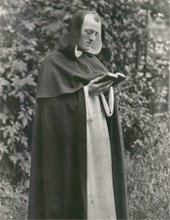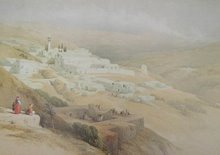We must, however, not forget that Father McNabb would never claim originality or even ingenuity for any of the things about which he taught or preached. His great pride - if we are permitted to use that word in this context - was that he taught only what the Church taught: in particular that he taught almost exclusively from Holy Scripture and from the works of the Angelic Doctor. All that may strike us as unique about Father McNabb’s teachings - he himself would never claim anything unique for them, of course - was in their emphasis and application.
And there were many sides to Father McNabb: as well as being the devoted preacher of Rerum Novarum in works such as The Church and the Land, Nazareth or Social Chaos and the aforementioned Old Principles and the New Order; as well as being the ‘celebrity friar’ who appeared at public meetings, who spoke at Speakers’ Corner and at Parliament Hill, and preached at great Catholic funerals such as that of Cecil Chesterton: as well as all this Father McNabb was a busy teacher and a retreat master, in both cases for lay people as well as clerics. His classes on St Thomas - open to all-comers - were very popular; and from his retreats a devotee of his - Dorothy Findlayson - culled sufficient verbatim shorthand notes to have printed, with his permission, a number of slim but rewarding volumes of spiritual advice: Stars of Comfort, In Our Valley, The Craft of Prayer, The Craft of Suffering, Joy in Believing, God’s Way of Mercy and Mary of Nazareth. Most of the chapters in these volumes are meditations on a few lines of Holy Scripture, or a line-by-line analysis of one of the great prayers of the Church.
Father McNabb was also an enthusiast for Chaucer and Francis Thompson and wrote essays on these, and other, poets and writers. His diverse collections of essays are entitled Francis Thompson and Other Essays, Our Reasonable Service, Thoughts Twice-Dyed, From a Friar’s Cell and The Wayside: A Priest’s Gleanings. He was also - it has to be admitted - a rather casual biographer: he wrote a slim work on St John Fisher. He also wrote a number of small books on aspects of Holy Scripture: The New Testament Witness to Our Lady, The New Testament Witness to St Peter, Meditations on St John, St Mary Magdalen, The Doctrinal Witness of Infallibility of the Fourth Gospel. His work, The Life of Our Lord, was written under strict obedience: it is a strange book, full of curious omissions and odd emphases, which unhappily reflects the author’s reluctance to take on such a demanding subject.
Interestingly, the very first book for which Father McNabb was responsible was an edition of the decrees of the First Vatican Council: his first printed pamphlet, entitled Infallibility, was a version of a lecture he had been asked to give to the Anglo-Catholic Society of St. Thomas of Canterbury. Father McNabb showed great interest in the possibility of the Anglican Church re-uniting with the Catholic Church: he often spoke to Anglican and Anglo-Catholic meetings and expressed great concern for the continuing de-Christianisation of their sect, from which concern sprang his book The Church and Reunion. He also took an interest in the poor Jews of Whitechapel and East London in general, and was held in great affection by the Jewish community there.
In a more theological context, Father McNabb initially made his name as a preacher and teacher - beyond the walls of the Dominican institutions which he served - with his conferences on faith and prayer at the Catholic Chaplaincy of Oxford University. Initially published separately, these conferences - with some slight revisions - were eventually published in one volume, Faith and Prayer, and constitute the most substantial contribution Father McNabb made to more academic theological writing. He also wrote a slim book on the Blessed Sacrament - God’s Good Cheer - a collection of theological essays, Where Believers May Doubt, which concentrates on the relationship between Holy Scripture and scholasticism, and another collection of similar essays, Frontiers of Faith and Reason, which covers a variety of topics from the origin of the epiclesis to a plea for the re-introduction of the Sarum Rites of Betrothal and Marriage.
Aside from these works Father McNabb was also a great contributor to periodicals of many sorts, from GK’s Weekly, where his writings rubbed metaphorical shoulders with those of Chesterton, Belloc and TS Eliot, to the more obvious Catholic periodicals, Blackfriars and the then-orthodox Tablet. While Father McNabb was clearly more than a ‘one-issue man’ it is striking how many of these books and articles touch upon, even dwell upon, matters relating to the social teaching of the Church and to the family.
Wednesday, 18 April 2007
Subscribe to:
Post Comments (Atom)


No comments:
Post a Comment